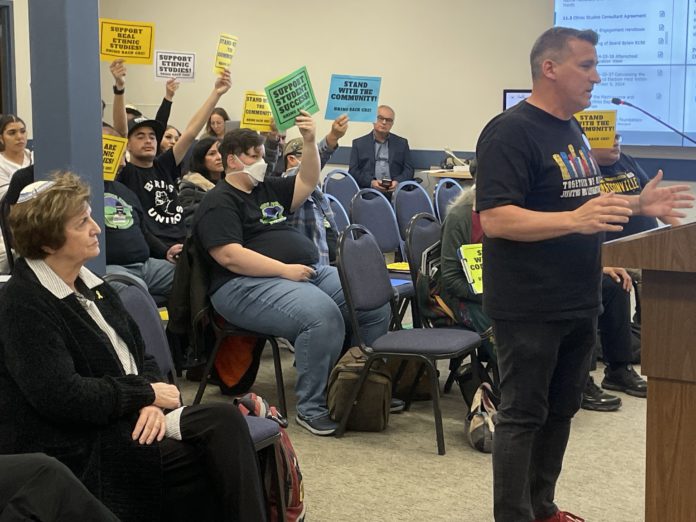
The Times of Israel and the Anti Defamation League have labeled as antisemitic comments made on April 16 by two Pajaro Valley Unified School District Board trustees.
In addition, Santa Cruz County Superintendent of Schools Faris Sabbah has denounced the comments.
During that meeting, the board approved a contract with Community Responsive Education (CRE), a company that provides training to teachers and administrators on how to teach the district’s ethnic studies curriculum.
That was the newest chapter in a story that began in October 2023, when the board voted not to renew the contract with CRE, which had been in use at the district’s three comprehensive high schools since 2021.
The rejection dated back to a 2019 pilot ethnic studies curriculum that was developed for the California Department of Education, portions of which members of the Jewish community, educators and lawmakers deemed antisemitic.
The state curriculum was scrubbed and rewritten, and the issue was addressed during a conference with prominent Jewish leaders, lawmakers and State Superintendent of Public Education Tony Thurmond.
During that conference, Sen. Scott Wiener, co-chair of the Jewish Caucus, said that attacks on the Jewish community will get worse unless the issue is addressed.
One of the authors of the rejected curriculum, Allyson Tintiangco-Cubales, who also created CRE, has repeatedly denied the allegations of antisemitism, a claim backed by many of the people supporting the program. What followed was more than a year of protest from teachers, students and community members who attended numerous meetings demanding the trustees reverse the decision.
The comments
The April 16 discussion included public comment from supporters and members of the Jewish community opposing the contract.
Doug Kaplan pointed to what he called the “hateful rhetoric against the Jewish community.”
“The question before all of you is how we teach our students to deal with these hate-filled words,” Kaplan said. “Ms. Tintiangco-Cubales’s approach is to divide our world into two camps: there are good guys and there are bad guys, there are oppressed and there are oppressors. Does this approach help to heal and unite our community, or does it fuel the hatred?”
Rabbi Debbie Israel of Congregation Emeth in Morgan Hill described CRE as a “one-sided, discriminatory approach to ethnic studies,” and said that ethnic studies should respect the rights of all people for self-determination. That doesn’t happen with CRE, she said.
“CRE attempts to deny this right to the Jewish people,” she said. “Why are Jews the only minority that is not allowed to define prejudice against us?”
Israel asked the board to reject CRE and instead select an ethnic studies consultant that “builds bridges of mutual respect and understanding rather than walls of distrust, resentment and suspicion.
Trustee Gabe Medina questioned Israel’s use of the word “minority.”
“The minority is sitting on this side right now,” he said, pointing to the audience. “The minority are the people that have been treated with so much disrespect over these years.”
Then, in response to the three people in the audience who spoke against CRE, Medina said, “I don’t see you people out protesting against immigration. I don’t see you at protests, when people are being taken away right now…You only show up to meetings when it’s beneficial for you so you can tell brown people who they are. But guess what? We’re defining our own stories now.”
Medina then made a motion to censure former PVUSD trustee Kim De Serpa, who was outspoken in her opposition to CRE, for the fallout from rejecting the contract.
That motion failed 4-3, with trustees Joy Flynn, Misty Navarro, Olivia Flores and Carol Turley dissenting,
Trustee Joy Flynn said she saw no antisemitism in the way CRE teaches ethnic studies.
“Are we looking at the same pedagogy? I truly believe that there is no educator in PVUSD that is taking this training that would allow any erosion of dignity of any human being in their classroom under any circumstances,” she said.
Flynn also talked about the power that some groups have over others.
“I’ve been a little bit taken aback by the lack of acknowledgement of the economic power historically held by the Jewish community that the community of Black and brown people don’t have,” she said.
The responses
Sabbah said in aletter to thge PVUSD board that his office has received “a number of questions and concerns regarding conduct and rhetoric at PVUSD board meetings,” and said the comments, “appeared to invoke antisemitic tropes.”
His own observations, he said, have confirmed those concerns.
“Regardless of intent, I hope you can appreciate how such comments can cause significant harm to the PVUSD community,” he said.
Sabbah also suggested that the board complete additional conflict resolution training, and that legal counsel be present at future meetings.
He declined to list specifically what he considered antisemitic.
In response to Sabbah’s post, Medina said on his Substack page that labeling board comments as “antisemitic tropes” without first analyzing the comments “reduces a complex and painful debate to vague accusations.
“This tactic chills speech, especially when used against trustees of color challenging systems of power,” Medina said.
“Meanwhile, where is the outrage for the consistent erasure and trauma experienced by our Black, brown, Indigenous, and Palestinian students,” Medina said.
In response to Sabbah’s suggestion for conflict resolution, Medina said that such training is often used “as tools to neutralize transformative leadership, especially when that leadership comes from people of color.”
“I’m not interested in performative inclusion,” he said. “I’m interested in justice.”
Marc Levine, the Central Pacific Regional Director for the Anti-Defamation League, said he was disturbed by what he saw during the meeting.
“The raw antisemitism that was on display at the Pajaro Valley USD board meeting is abhorrent and dangerous,” Levine said. “Most disturbing was that the rhetoric came from elected board members. What does this say about their willingness to allow ethnic studies to be used as a gateway for antisemitism to seep into their classrooms? The board owes the Jewish community an apology plus a commitment to engage in serious reflection and education.”
In an emailed statement, PVUSD superintendent Heather Contreras said that the district “stands firmly against all forms of racism, antisemitism, and hate.”
“We are committed to fostering a safe, inclusive, and respectful environment for all students, families, educators, and community members—regardless of background, race, religion, or identity,” she said.
Contreras said that she is working with the board to develop specific actions to address the concerns.
Legal counsel will be present at the next meeting, Contreras said, when the Board will discuss whether that will occur at future meetings.












Hey Steve Trujillo
Let’s hear you defend PVUSD now. This whole ethic studies stinks. Well when Trump pulls more funding from the county the chickens will come home to roost.
Remember when you went on a zoom meeting of the city council with the f**ck trump sign behind you?
Now Trumps F**cks you and your crew. Try being a little more tolerant of others in the future
Calling for tolerance while celebrating a dictator pulling funding from public schools is…something. Remember, Cornholio, fascists don’t have friends. Trump will eventually screw you, too.
Flynn and Medina must go. They will continue to be a distraction and hold back PVUSD’s progress.
“Meanwhile, where is the outrage for the consistent erasure and trauma experienced by our Black, brown, Indigenous, and Palestinian students,” Medina said.
Watsonville, please don’t take what this clown is saying as a representation of how “Americans” of Mexican descent think. Medina is a divider and doing more harm than good. The rest of the board knows this.